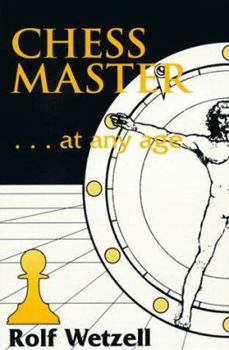Chess Master...at Any Age
Select Format
Select Condition 
Book Overview
How one man, tired of languishing in the ditch of chess, rose above it and became a master, after 50! -3rd printing. Reaching a plateau of chess strength after many years of playing, Rolf Wetzell... This description may be from another edition of this product.
Format:Paperback
Language:English
ISBN:0938650580
ISBN13:9780938650584
Release Date:January 1994
Publisher:Thinkers Pr Inc / Chessco
Length:300 Pages
Weight:1.01 lbs.
Dimensions:9.3" x 0.8" x 6.3"
Related Subjects
GamesCustomer Reviews
4 ratings
A Kindred Spirit Wrote An Expectedly Complex Book
Published by Thriftbooks.com User , 19 years ago
This was a book I simply had to have, as the author and I have rather similar backgrounds, both of us being MIT electrical engineers, and both of us wanting to greatly improve our chess play beyond age 50. It is obvious that he and I have had similar professional training, for he has written a book that is complex and highly analytical, in true MIT fashion, and something I would likely have done myself. The author provides a very detailed, well-thought out, and documented model of chess proficiency, and in the same analytical manner, presents methods for improvement. Even if you too are an MIT engineer, this makes the book hard to follow and masks the essential *methods* of the improvement program --- methods which in fact are quite appealing, if a bit dated in their manual rather than computerized approach (the book isn't all that new any longer and dates back to a somewhat earlier age of computer use). A reader interested only in the "how to" might perhaps successfully skip the whole first half of the book! The book rates four stars because the methods are good and will surely result in progress, and because the program is thorough and holistic. I take off one star because it's a difficult read and there is a temptation to chuck it after about 100 pages or so. The book has also become a bit of a collector's item and therefore not inexpensive.
Good Self-Help Book for players stuck at a rating plateau
Published by Thriftbooks.com User , 25 years ago
This book is very interesting to read. The first portion of the book could be skipped if you are willing to take his ideas on faith alone - I skimmed the first section and concluded that the ideas were reasonably sound.The second part of the book consists of the actual improvement methods. The main lessons from the book are that1) most people get stuck at a certain level after a number of years of playing chess, 2) unless you study smarter (not harder) or do something drastically different in your routine, nothing will change, 3) you need to allocate some of your study time to re-inforce what you already know, 4) you MUST study your own games - especially losses very critically and honestly.In my opinion, some of the earlier reviews were unduly harsh regarding the use of computer technology or flashcards and gave the book an artificially low review. It is the method and the ideas that are important. It really doesen't matter so much whether you use hard-copy, computers, flash cards, etc. Just do what works best for you, BUT DO IT!
1300-1700USCF in 2 yrs thx to this and 5 other books
Published by Thriftbooks.com User , 26 years ago
Although the author goes overboard with his own chess terms like "APROP" (i prefer 'visualization'), the advice in this book is very well thought out and most importantly USEFUL! I would recommend using computer software instead of flash cards though. Overall, A big thumbs up from me! The other 5 books are: 1. Chess tactics for students by Bain. 2. Essential chess endings by Silman. 3. How to reassess your chess by Silman. 4. Chess master at any age by Wetzell. 5. The ideas behind the chess openings by Fine. Start with Bain first then use the other 5 in combination. The KEY is to ANALYSE your OWN GAMES using a computer for tactics and a strong human for positional play. Then store the important concepts into chess computer software. Finally, review these concepts so that you know them like the back of your hand. Discipline yourself and good luck!
A wonderful book on chess thinking and improvement!!
Published by Thriftbooks.com User , 27 years ago
A sad, and true, fact is that most chess players show little improvement in their game after several years of study and play. Why? Because it's difficult to change our thinking about how we each play chess. Old, bad and erroneous thinking habits prevent us from becoming stronger. Wetzell's book does a tremendous service to the chess player by showing how to identify bad and sloppy thinking habits, and then, how to eradicate them from one's play. Chapter 1 explains the five components of chess strength: images, ability to project positions (see future positions in your mind), move selection method, attitude, and genetic factors. Individual chapters then concentrate on each component. Wetzell explains how to analyze your own game with respect to each component, then offers specific and detailed methods of improving each factor. The final chapter concludes with a long range plan for improvement. I read a tag line for this book which went: "Wetzell didn't study harder, he studied smarter!". I agree. If you are serious about improving your chess, then Wetzell's book will show you how. Learn to think differently about yourself as a player and about chess as a game. Improvement is sure to follow.






